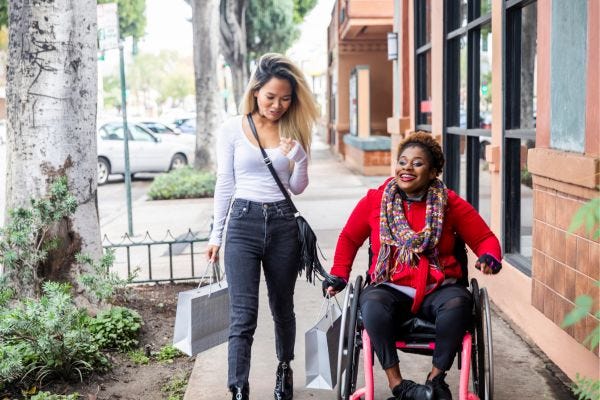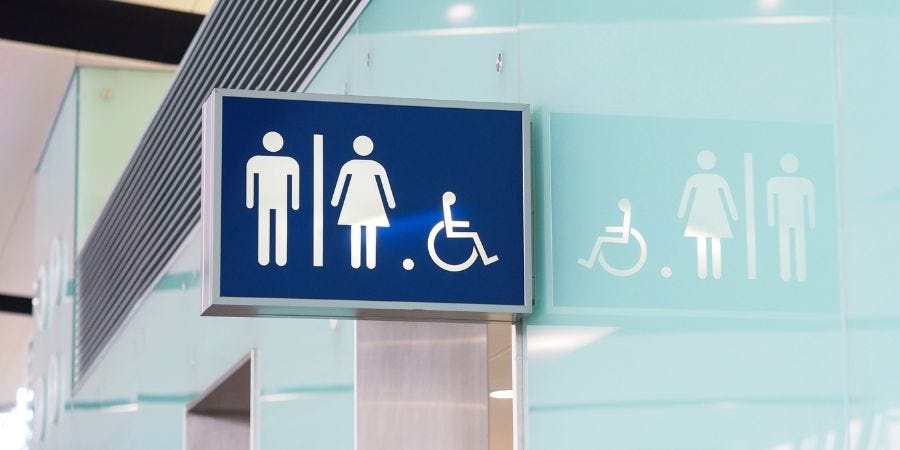Key Takeaways:
- Ally’s Law, also called the Restroom Access Act, ensures people with certain medical conditions have access to restrooms to avoid accidents.
- You may be able to use an “I Can’t Wait” card to gain access to public restrooms in participating states.
- Ally’s Law advocates for inclusivity and a new level of compassion for individuals with bladder or bowel incontinence.
INCONTINENCE PRODUCTS THROUGH INSURANCE:
Aeroflow Urology is in-network with many Medicaid and Medicaid-managed insurance plans and is accredited by Medicaid. Complete our Eligibility Form, and we’ll automatically check to see if your plan covers incontinence supplies. ***Must meet certain requirements to qualify.***
You will also receive the care and attention every person managing incontinence deserves: A personalized list of 100% insurance-covered incontinence supplies, a dedicated Continence Care Specialist you can contact during business hours, a user-friendly online portal for easy monthly reordering, and educational content.
Get the continence care you need with the dignity you deserve. Join the Aeroflow Urology family today! It only takes 5 minutes to get started.
If you have incontinence or are a caregiver for a loved one with the condition, you should know about Ally's Law!
Also known as the Restroom Access Act, the law expands the rights those with incontinence have, allowing individuals with certain conditions to use public restrooms that would otherwise be off-limits.
Learn how to use Ally’s Law to avoid accidents and relieve stress while in public.
What Is Ally’s Law?
Ally’s Law (Restroom Access Act / Crohn’s & Colitis Fairness Act) is a law that was passed by 14-year-old Ally Bain’s mother and 2 Illinois state representatives in 2005.
When Bain, who was living with Crohn’s disease, was shopping in a public mall, she had an intense and sudden need to use the restroom— something that’s common in individuals with Crohn’s disease, ulcerative colitis, and other medical conditions that cause incontinence.
Although Bain required a restroom, she was denied access, causing her to have an accident in the mall. Afterward, Bain’s mother worked with the Illinois representatives to pass Ally’s Law.
The law ensures that individuals with certain medical conditions, such as inflammatory bowel disease (IBD), Crohn’s disease, ulcerative colitis, and ostomies, have access to employee-only restrooms when certain conditions are met. These conditions include:
- The retail establishment must have 2 or more employees present in the store.
- The employee-only restroom must be located in a safe place that wouldn’t pose an obvious security risk to the retail establishment.
- The individuals using Ally’s Law must present a signed document from a healthcare provider stating what their medical condition is that causes incontinence or present an “I Can’t Wait” card.
Ally’s Law has been enacted across multiple states in the US, including:
- California
- Colorado
- Connecticut
- Delaware
- Illinois
- Kentucky
- Louisiana
- Maine
- Maryland
- Massachusetts
- Michigan
- Minnesota
- New Hampshire
- New York
- Ohio
- Oregon
- Tennessee
- Texas
- Washington
- Washington D.C.
- Wisconsin
How Can Ally’s Law Help People With Incontinence?
Ally's Law, also known as the Restroom Access Act, is a crucial piece of legislation designed to aid individuals with medical conditions such as incontinence. Enacted in various states across the United States, Ally's Law requires retail establishments to provide access to employee restrooms to individuals suffering from medical emergencies, including those related to incontinence, even if the facilities are reserved solely for employees.


When you’re managing incontinence, finding and accessing a bathroom to avoid accidents can be challenging at home in public. Traveling outside of your home for social activities, work, and school can feel frightening when you don’t know where restrooms are.
Many retail establishments forbid the public from using employee-only restrooms, so even though a toilet is available, people aren’t permitted to use it. This seems unfair all around, but if you lose control of your bladder or bowels in public, it can seem extremely unjust.
By using Ally’s Law, you can ensure that your medical condition is seen and addressed while you’re in public, giving you access to restroom facilities. This law showcases inclusivity— something that everyone needs to be aware of in these situations. By requiring businesses to provide restroom access if you’re experiencing a bathroom emergency, this law can help relieve your stress and anxiety that comes with venturing into public with incontinence.
You can use the Restroom Access Act to empower yourself or your loved ones to engage in activities outside your house with peace of mind, which can make a significant difference in your ability to participate in daily life without the fear of embarrassment or shame.
How Do I Use Ally’s Law?
If you or your loved one has incontinence, you may be able to use Ally’s Law to help avoid accidents, relieve stress, and access a restroom quickly in public, even if it’s an employee-only restroom.
You’ll need to show proof of an eligible medical condition to an establishment’s employee or business owner. Your proof can be a signed document from your or your loved one’s healthcare provider.
The document will need to state which medical condition you or your loved one has and that due to the condition, you or your loved one needs immediate access to a public restroom, including an employee toilet facility. You may also use an identification card your state’s organization can provide.
You can join the Crohn’s & Colitis Foundation where you’ll be provided with an “I Can’t Wait” card that will ensure you access to public restrooms in participating states. To request a card, call 888-MY-GUT-PAIN (888-694-8872).
Check Your Eligibility
2 Easy Steps
Discover the continence care essentials available through your Medicaid plan.
Ally’s Law can be a safeguard for people with bladder and bowel control conditions, providing emotional and physical relief. By ensuring bathrooms are available to those in need, this inclusive law can improve quality of life and set a new standard of compassion for all.
References
Restroom Access. (n.d.). Crohn’s & Colitis Foundation. Retrieved March 12, 2024, from https://www.crohnscolitisfoundation.org/patientsandcaregivers/get-involved/be-an-advocate/restroom-access
Disclaimer
Information provided on the Aeroflow Urology blog is not intended as a substitute for medical advice or care from a healthcare professional. Aeroflow recommends consulting your healthcare provider if you are experiencing medical issues relating to incontinence.











